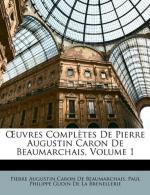|
This section contains 11,474 words (approx. 39 pages at 300 words per page) |

|
SOURCE: “After the Fall: The Chute of a Play, Droits d'Auteur, and Literary Property in the Old Regime,” in French Historical Studies, Vol. 22, No. 4, Fall, 1999, pp. 465-91.
In the following essay, Brown examines literary property rights of eighteenth century playwrights, considering the views of Beaumarchais in advocating greater control for authors in the royal theater.
Among the papers of Pierre-Augustin Caron de Beaumarchais, there is a manuscript titled “Difficulté de fixer le taux de chute d'une pièce.” Begun in August 1777, these twelve folio pages argue that the royal theater, the Comédie Française, should assure playwrights droits d'auteur and propriété littéraire.1 Beaumarchais offers no high-minded defense of free expression or physiocratic comparison of writers' scripts to real estate, as did Denis Diderot in a pamphlet republished the same year defending printers' privilèges. This difference in argument can be attributed to context—Beaumarchais expressed...
|
This section contains 11,474 words (approx. 39 pages at 300 words per page) |

|


